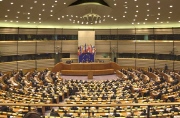 There are several things that Romania has in common with my home country Britain: the worship of the car and under-investment in railways; slow progress when it comes to tackling climate change and, most noticeably, a feeling of being on the “edge” of Europe. Britons feel closer to America than continental Europe and refer to “the Continent” as somewhere quite distant and remote from their daily concerns. Both populations share a lack of interest in the European Parliament elections.
There are several things that Romania has in common with my home country Britain: the worship of the car and under-investment in railways; slow progress when it comes to tackling climate change and, most noticeably, a feeling of being on the “edge” of Europe. Britons feel closer to America than continental Europe and refer to “the Continent” as somewhere quite distant and remote from their daily concerns. Both populations share a lack of interest in the European Parliament elections.
Until Slovakia broke the “low turnout” record in 2004, with just 17% of the population voting at the European Parliament elections, Britain had previously held the record for having the least motivated EP voters. At the 1999 EP elections only 20.4% of the British population bothered going to vote.
Romania is the latest challenger to the holder of the “lowest turnout” record at the EP elections. Judging by the lack of interest shown in the election by Romania’s political parties, who should be the “drivers” of election campaigns, it is no surprise that the media find it hard to treat the issue as a news story.
The fundamental problem in both Britain and Romania is that ordinary people do not understand the role, function or purpose of the European Parliament and neither the political parties or the media – in either country – have succeeded in bridging this gap. In Britain the powerful tabloid media have done much to undermine public confidence in the European institutions.
At CNA’s conference on “The Media and the European Parliament Elections” the issue of low turnout and public information were discussed from various perspectives. Many of the comments made are valid for Romania, Britain, as well as many other of the 27 EU Member States.
Speakers from Poland, Slovakia, Hungary and Bulgaria agreed that low turnout resulted in the extremist parties winning more seats in the EP, as the supporters of these parties tend to be more disciplined. According to Krzysztof Bobinski, political analyst and candidate at Poland’s 2004 EP election, “Of the 54 places allocated to Poland in the EP about half were won by parties which were openly hostile to the European Union, or deeply eurosceptical.” Bobinski also explained that this has had a negative impact on Poland’s image in the EU.
Aside from the criticisms from Private TV stations about “over-regulation” when it comes to reporting on Romanian elections, one of the most interesting comments came from Mihail Virtosu, founder of the Romanian branch of the International Advertising Authority. Virtosu was the only speaker who saw the EP elections in a positive light, as an opportunity for Romanian politicians to escape from dirty local fights and engage on a European level: “this is the moment we have all been waiting for” he said.
Vitrosu also described the skills and resources that are now available in Romania’s booming PR and advertising industry, and said “if only the politicians knew how to work with advertisers and the media they could succeed in informing the public about European issues.”
Vasile Dincu, one of Romania’s most respected MEPs, described the difficulty the European Parliament has in communicating with ordinary people in the Member States, a real problem that has not yet been resolved at the EU level. Dincu said „Europe is very fragmented and the only thing we really have in common is a set of values. In Germany they managed to build an election campaign on these common European values, and it worked well.”
This article was also published in Dilema Veche magazine.